After China’s idol industry has experienced explosive growth since 2018, it has developed a new fan organization with strict discipline and code of conduct — the “Fan Circle”. It’s a group gathered with loyal fans and actively support their idols online and offline. Fan Circle has gradually transformed from brand audiences to active participants and brand marketing facilitators all because it’s a way to show their love to idols.
In China, understanding the Fan Circle’s rules and behaviors is very important for brand marketing and development. As the entertainment industry is becoming more mature in China, how can brands establish a good relationship with idols’ fans? In this analysis, you will better understand the consumption behaviors of Chinese fans.
1. Consumption for idols is becoming part of the daily consumption of Chinese young people
1.1 The commercial influence of Chinese idols is impressive
According to the data from the 《White Paper on the Idol Industry and Fan Economy in 2019》, with the rise of post-95 and post-00 consumer power, the younger generation’s willingness and ability to consume for idols are continuously growing. It is estimated that in 2020, the Chinese idol market size can reach 100 billion RMB. Unlike ordinary fans who passively accept cultural influence, fans in the “fan circle” call their way of expressing their love for idols as “support”. They strive to maintain and grow their idol’s popularity, reputation and business value. Fans in the “fan circle” will frequently purchase music albums or products endorsed by idols as well as actively and repeatedly generate posts and comments on social media. In China, buying idol-endorsed-products has surpassed supporting idols’ works and become the second most important way of supporting. Corresponding brand sales and word of mouth are also in full swing with the fan circle’s hel
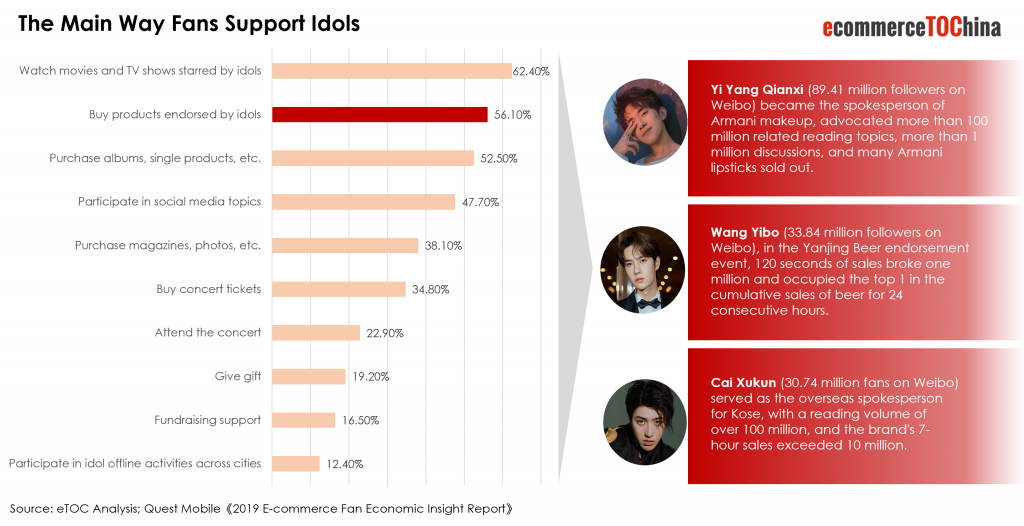
1.2 Fan circle are shifting from youth to diversified crowd
In terms of fan attributes, besides the high proportion of “girlfriend fans” in the traditional sense, more fan levels such as “mother fans” and “sensible fans” are emerging, and the purpose of popular star-chasing has become diversified. The middle-aged people with high spending power also actively participating in the fan economy. They regard idols as the deep sustenance of their emotions and give family-like care. Simultaneously, “career fans” who take “caring about idol career development and facilitating resource acquisition” as their mission have risen significantly, accounting for more than 40%.
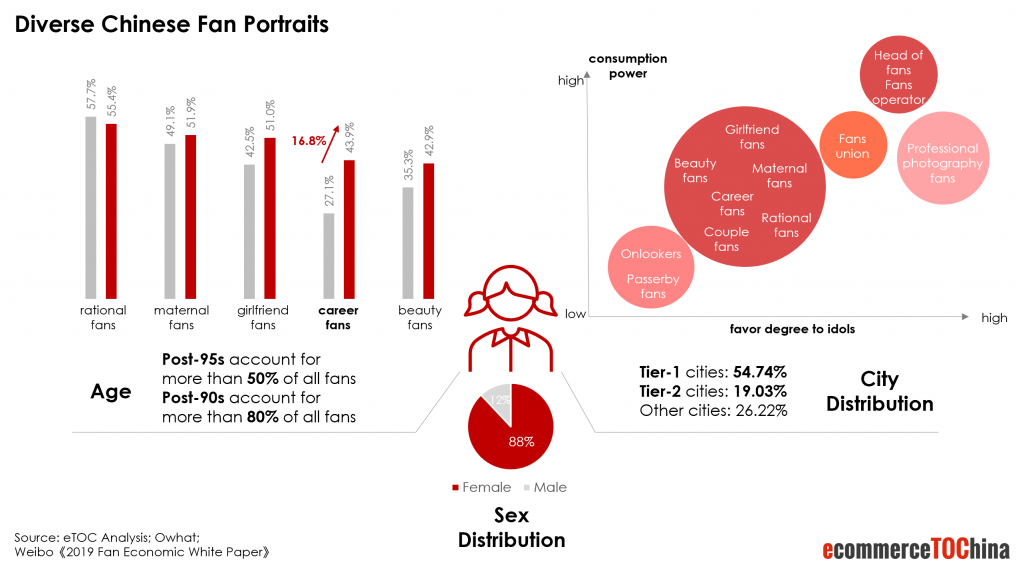
2. A brief history of the labor division and development of Chinese contemporary fans: how did such a huge sales volume come from?
2.1 What is Fan Circle?
Traditional stars are promoted based on their acting, singing, or other performing skills, so they cannot be replaced. Therefore, they have a cooperative relationship with the capital. Capital provides funds, and traditional stars provide performances and productions. However, the current post-90s idols are more like assembly line production, supported by capital tools. From casting to training, from marketing to production, all are managed by one giant company. Therefore, idols usually have very little bargaining power; the fund behind takes the actual charge.
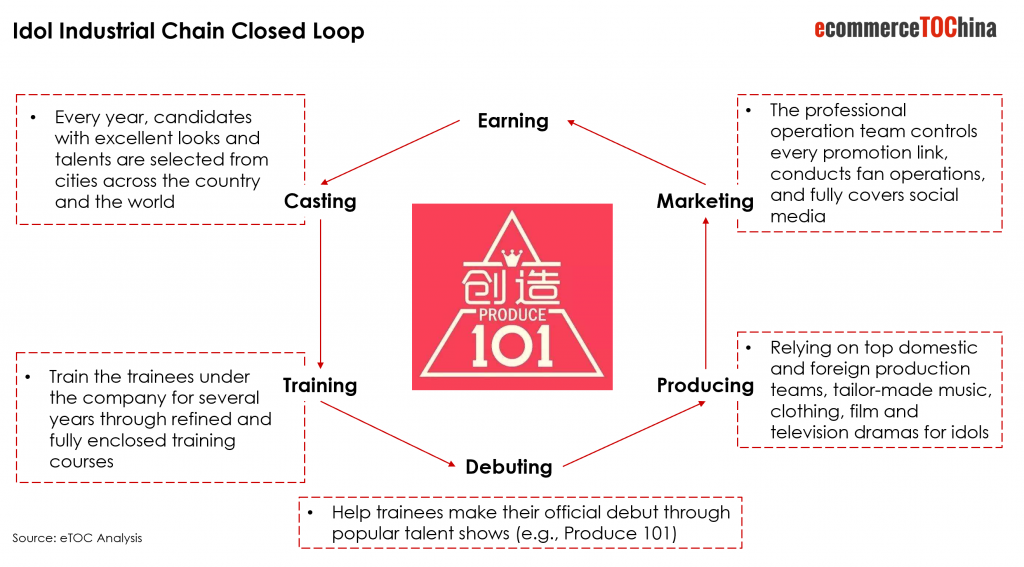
2.2 What are professional fans?
To simplify, idols and professional fans are both capital wage earners, idols are responsible for attracting customers, and professional fans are responsible for active customers. They are actually in a tie. The professional fans’ daily work is to urge fans to consume or boost ranking data, and at the same time, produce content and words that are conducive to celebrity public opinion and distribute them to the fans below.
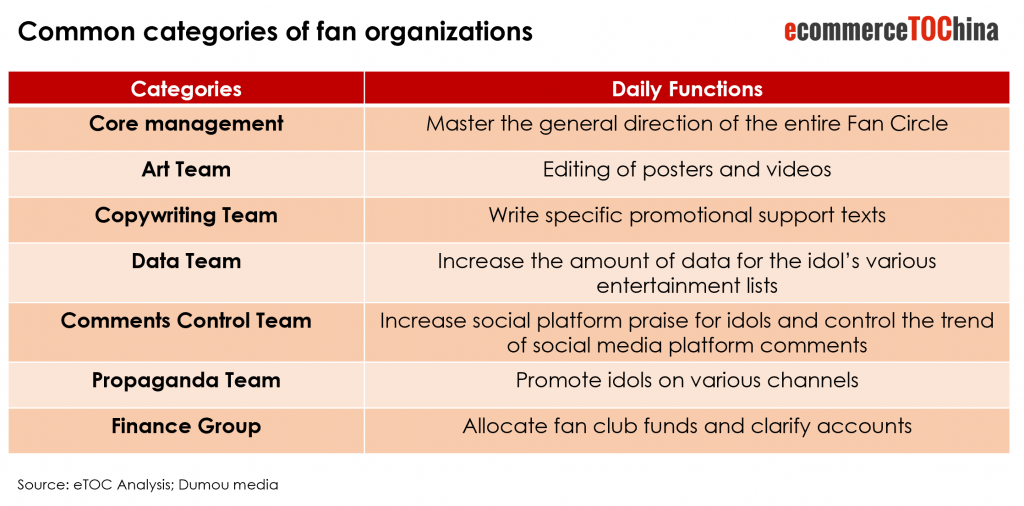
2.3 A brief history of Chinese fans economy development: Why do contemporary fans in the Fans Circle share their idols' glory and shame?
In the 1970s, Teresa Teng’s appearance was criticized at the time and became a depressive voice. The essence is the return of personal emotions under decades of collectivist values.
In the 1980s, Cui Jian’s “Nothing” announced Chinese rock music’s birth and represented the official return of “Oneself”.
In the 1990s, idols represented by “the four kings” answered the question, “What kind of life do I want to live?”
At the beginning of the 21st century, singers such as Jay Chou and Stefanie Sun told everyone that there is no need to live a conformist life. On balance between the collective and the individual, the tide of individualism has won a full victory.
In September 2012, Lu Han won a Guinness World Record-the for most commented Weibo post globally. This event announced the advent of the Fan Circle era. In 2014, prototypes of a new generation of Fan Circles, such as TFBoys, began to appear. In 2018, accompanied by idol trainees, a new generation of Fan Circle has completely stepped onto the stage. Until 2020, when the Xiao Zhan incident broke out, the Fan Circle completely invaded the public’s vision across the country. The series of disturbances brought about also made the market realize the strength of this organization group.
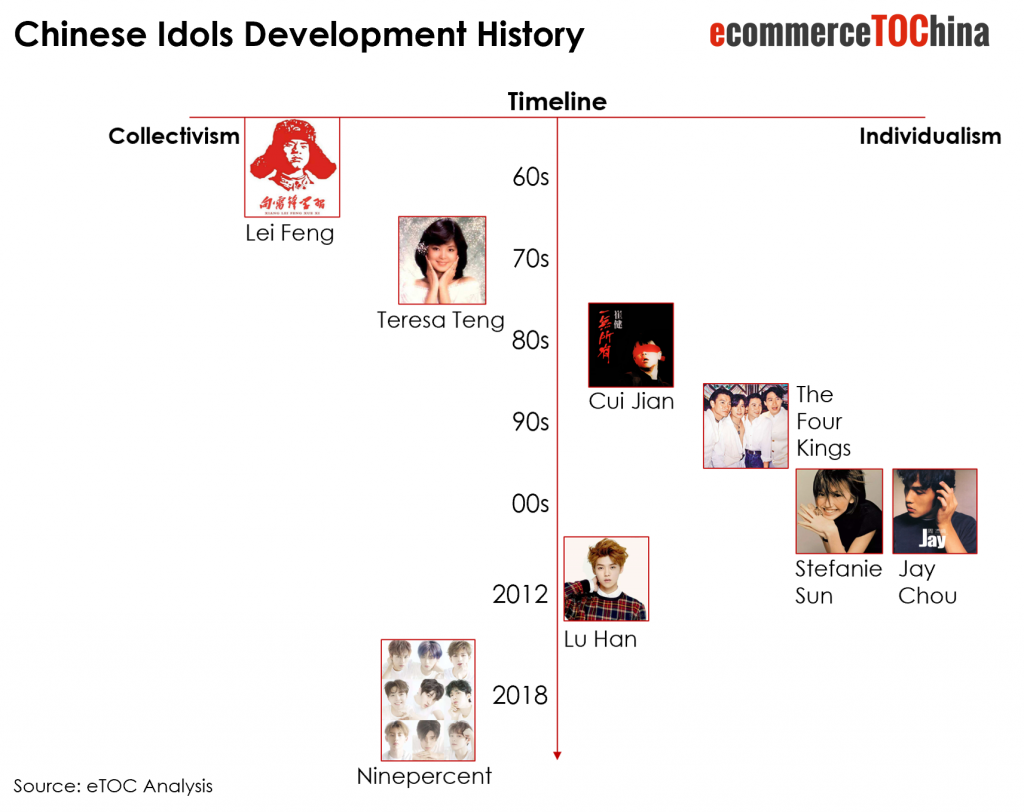
Today’s young generation lacks the spirit of the times, lacks ideal pursuits, lacks a vital goal, and entertains themselves to death. Everyone began to yearn for the collective again and desired for a collective to give themselves identification. The Fan Circle gave everyone everything they wanted. Or it satisfies everyone’s collectivist needs illusory.
3. To be continued:
Continue reading: 2nd part — “How can brands benefit from Chinese Idol Industry and Fan Economy?”

Discover the Future of Shopping with "Shopatainment – The Future of Shopping"
Our new book “Shopatainment – The Future of Shopping” explores how the innovative fusion of shopping and entertainment is revolutionizing the way we shop. Learn about the origins of this trend in China, the technologies and formats being used, and the opportunities and challenges it presents for the West.

Want to have a first free consultation session about digital marketing and e-commerce in China? Contact us.
